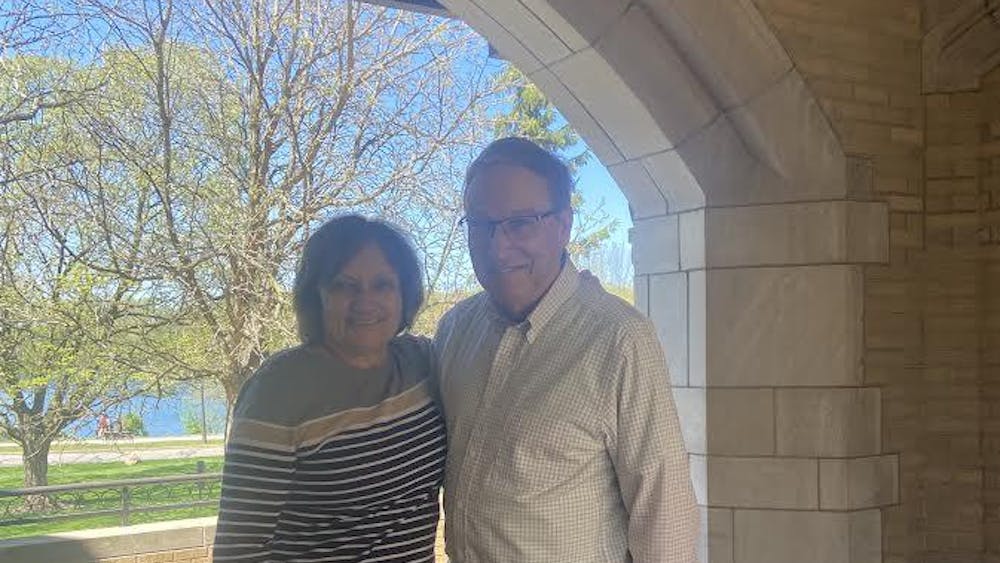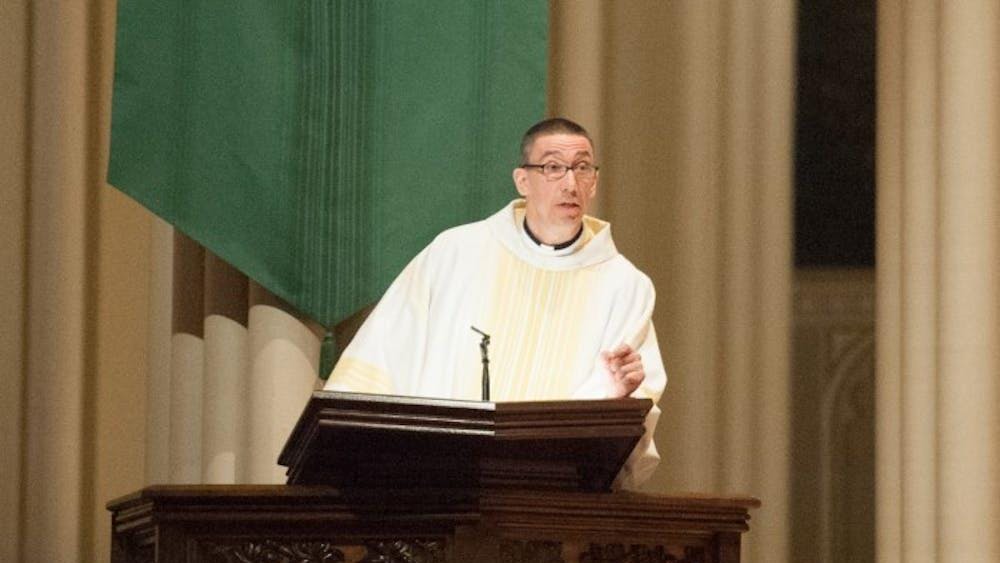In honor of Martin Luther King, Jr. Day, the Office of the President, the President’s Oversight Committee on Diversity and Inclusion and the Division of Student Affairs co-sponsored a panel discussion and dinner titled “Exploring Our History and Our Future: 70 Years of Black Student and Alumni Experience at Notre Dame” at Legends on Monday night.
[gallery type="square" ids="63412,63409"]
The panel was moderated by 1969 alumnus Don Wycliff, editor of the book 'Black Domers: Seventy Years at Notre Dame,' and panelists included alumni Azikiwe Chandler ('94), Arienne Thompson ('04) and Olevia Boykin ('14), as well as current senior Demetrius Murphy.
The panelists began by speaking on their individual experiences at Notre Dame as black students. Boykin, now attending Yale Law School, said she had a very fulfilling intellectual experience at Notre Dame.
“As far as being black at Notre Dame, I think my experience was very similar to the stories in the book." Boykin said. "I struggled my first two years, figuring out what it meant to be black at Notre Dame.”
“I derived a lot of my identity from being black, being a black woman," she said. "It was different here in a way that was also hard to articulate.
“I didn’t really feel like I fit in with the black community … At the same time, I am not … in the 66 percent of students who come from families with $200,000 or more.”
Chandler said knowing what he knows now, he probably would not have come to Notre Dame, but he does not regret his time at the University.
“I hated my freshman year because I had very Afro-centric parents … My parents gave us African-American history lessons at home, so I came with a very strong identity here,” Chandler said.
“I did not fit in," he said. "Sophomore year was very empowering. A very good friend of mine, Fred Tumbar, was elected vice president of the student body, and he said, ‘Look, you can do something. You’ll be a part of my cabinet, let’s see what we can do.’
“With that, and SUFR [Students United For Respect], the student activism, we felt like we could do something to change this environment.”
While editing 'Black Domers,' Wycliff said he noticed students who graduated before 1970 typically seemed happier with their Notre Dame experiences.
“I thought a lot about why that might be and I settled on one explanation, which is that those of us who came up during the era of segregation probably expected less,” Wycliff said. “We thought, ‘Well, I’m smart as anybody,’ but didn’t necessarily expect that American society would recognize and reward that."
The panelists also discussed whether there is a single black experience at Notre Dame. Thompson, a multimedia entertainment journalist, said in her freshman year she believed there was just one standard experience.
“Of course, now that I am older and hopefully a bit wiser, you realize that there are clearly so many ways to be black, there are so many ways to be everything,” Thompson said.
Boykin said there is no one white experience at Notre Dame either, but one common trait is typical of white students.
“I think the typical white student at Notre Dame has not had to think about race. It’s a white privilege. For me, it’s harder to get people to think about it,” Boykin said.
“People are also generally uncomfortable," she said. "… There is not really a good way to talk about race, so people feel uncomfortable and they want to be politically correct and they don’t know how to do that.”
Murphy, a current resident assistant in Keenan Hall, said the University’s status as a Catholic university adds an interesting dynamic to the conversation.
“As a Catholic university, we have all these missions to … help people in need,” Murphy said. “You see kids with no problems going on ISSLPs and going to these different countries to do service and to help these needy people."
"They have no problem doing that, but then you want to have a conversation about things that affect the kids on campus and they’re not as willing to do that," he said. “I think as a Catholic institution, these are the things we should be worried about.”
Chandler said although he felt the minority students did not see all their demands met, the administration did try to support them.
“At the end of the day, I felt like [University President Emeritus] Fr. [Edward A. "Monk"] Malloy did feel that it was a responsibility to listen to what it was we had to say and to make sure that the wider campus was listening to what it was we had to say,” Chandler said.
The panelists also discussed how studying abroad changed their views of both their identities as blacks and their perceptions of how the world viewed their identities as blacks.
Murphy said prior to traveling to Panama and Mexico, he felt definitely African, but after leaving, he was American.
“Race is such a social construct, and once you are outside the society that constructed that race, you really know what a social construct it is,” Murphy said.
It is important to have blacks in important leadership positions on campus, such as resident assistants, Chandler said. Murphy said his position as an RA has offered him a unique way to make an impact.
“It has definitely given me the opportunity to educate kids that may have never had this opportunity or will probably never have to be this close to an African-American again in their life,” Murphy said. “It’s been a duty that I cherish and I am really happy it happened that way. It has made me grow as a person as well.”
Boykin said she believes an interview process with black students would go a long way toward addressing race problems on campus, both past and present and suggested the University should actively recruit black faculty members and students.
“I think we should be thinking more about that, who we are bringing here and what they are thinking when they come here,” she said.












